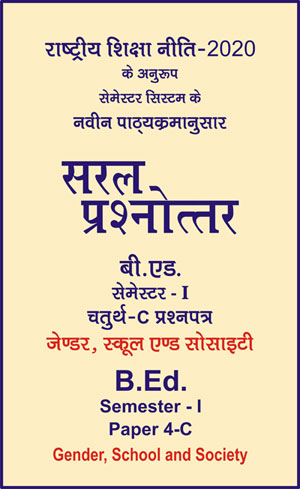|
बी एड - एम एड >> बी.एड. सेमेस्टर-1 प्रश्नपत्र-IV-C - जेण्डर, स्कूल एण्ड सोसाइटी बी.एड. सेमेस्टर-1 प्रश्नपत्र-IV-C - जेण्डर, स्कूल एण्ड सोसाइटीसरल प्रश्नोत्तर समूह
|
5 पाठक हैं |
||||||
बी.एड. सेमेस्टर-1 प्रश्नपत्र-IV-C - जेण्डर, स्कूल एण्ड सोसाइटी (अंग्रेजी भाषाा में)
Objective Type Questions
Note: Select the correct option.
-
Societies in which generations of families are related to each other on the basis of father’s lineage are called :
(a) Patriarchal family
(b) Matriarchal family
(c) Both of these
(d) None of these. -
Patriarchal societies are also called .......... societies.
(a) Conservative
(b) paternalistic
(c) Critical authority
(d) none of these. -
What does the line of descent in a society represent,
(a) the names of the family
(b) the property
(c) the titles
(d) all of the above. -
A term commonly used extensively by feminist scholars :
(a) patriarchy
(b) matriarchal
(c) patrilineal
(d) matrilineal. -
In patriarchal society, power resides in :
(a) men
(b) women
(c) senior citizens
(d) none of these. -
Patriarchal society is prevalent in :
(a) unequal power relations between men and women
(b) conservatism
(c) discord
(d) all of the above. -
In a patriarchal society, women are oppressed by :
(a) deprived.
(b) There is no freedom of decision making in all areas
(c) Victims of violence by men.
(d) All of the above. -
At the general level, the term patriarchy indicates the dominance of :
(a) female
(b) male
(c) human
(d) organism. -
The characteristics of patriarchy are :
(a) dominance of men
(b) protecting the authority of men
(c) discrimination against women
(d) all of the above. -
With the help of which tools does patriarchy reproduce its existence :
(a) Films
(b) Television
(c) Political economy
(d) All of the above. -
With what special identity are men attached to :
(a) the qualities of control
(b) strength and powerful body
(c) rational
(d) all of the above. -
What are the qualities that further encourage patriarchal issues in both the private and public sphere :
(a) low emotionality
(b) intelligent
(c) thoughtful
(d) all of these. -
On whom within and outside the family Economic, political and social restrictions are imposed on :
(a) women
(b) men
(c) children
(d) all of these. -
Due to which women are compelled to face exploitation towards themselves :
(a) Dependence on economic
(b) Lack of confidence
(c) Lack of independence
(d) all of the above. -
Gender roles are those roles which are expected of men and women on the basis of their ............:
(a) behavior
(b) caste
(c) Sex
(d) colloquialism. -
Gender roles are created due to :
(a) Individuals
(b) Communities
(c) Environments
(d) all of these. -
Who has given the above definition - "Gender is a reality, an experience that is present in every step of life". is related to."
(a) Rege
(b) Karl
(c) Moser
(d) Butt. -
............ is a structural force that affects power relationships - whether they are physically painful or not.
(a) matriarchy
(b) patriarchy
(c) ancient custom
(d) conservatism. -
The meaning of Patriarchy is :
(a) Traditional governance system
(b) Mother and Father’s rules over the family
(c) Father’s rules over the family
(d) None of the above -
What is patriarchy ?
(a) Such a system of society in which the oldest women is the head of the family
(b) Such a system of society in which the oldest male is the head of the family
(c) Both (a) and (b)
(d) None of these -
In matriarchal society :
(a) Transfer of property from mother to daughter
(b) Such a system of society in which the oldest women is the head of the family
(c) The women takes all the decisions of the family
(d) All of the above -
According to social feminism what is the second central material cause for the unequal treatment of the women :
(a) Capitalism
(b) Patriarchal system
(c) Laws
(d) Religion -
It is the rule of the father over all women in the family and also over younger socially and economically subordinate males :
(a) Patriarchy
(b) Polygamy
(c) Matriarchy
(d) Matrilineal -
What is the main reason for the need of the study of social gender in India ?
(a) Conservatism
(b) Patriarchy
(c) Both of the above
(d) None of these
|
|||||













